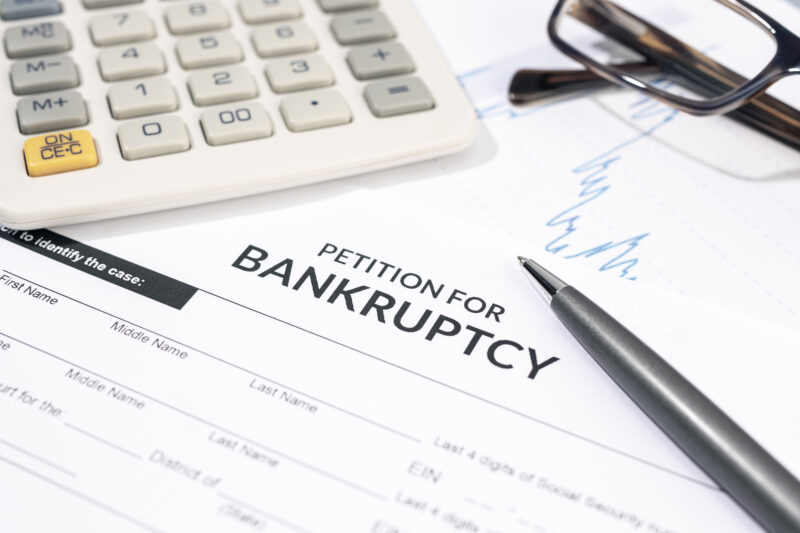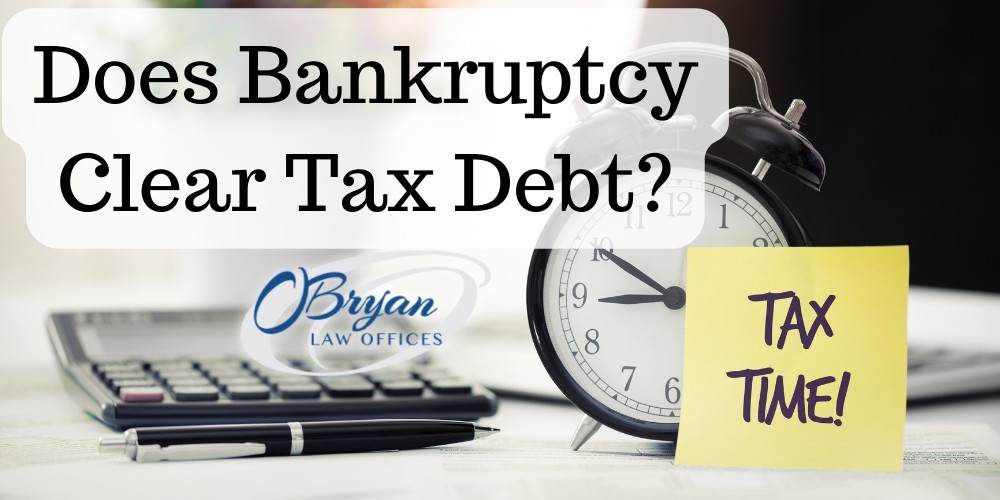Bankruptcy can clear some types of tax debt—but not all. While many forms of tax debt are nondischargeable, certain income tax debts may qualify for elimination under Chapter 7 or Chapter 13 bankruptcy, provided specific conditions are met. Understanding which tax debts can be wiped out and how the process works is crucial before deciding if bankruptcy is the right option for your financial situation.
If you’re struggling with tax debt and want to know whether bankruptcy can help you start fresh, our experienced Louisville bankruptcy attorneys can guide you through your options and help you make informed decisions.
Call O’Bryan Law Offices today at (502) 339-0222 to schedule a free consultation and get personalized advice.
What Is the Best Type of Bankruptcy for Tax Debts?
If eliminating tax debt is a primary goal, Chapter 7 bankruptcy is often the preferred option because it typically takes about four to six months to complete, compared to the three to five years required for Chapter 13. However, not everyone qualifies for Chapter 7. To have your tax debt discharged under Chapter 7, you must pass the bankruptcy means test, and your tax debts must meet specific discharge requirements.
It’s important to understand the types of tax debts that bankruptcy can address. Generally, only federal and state income tax debts may be discharged. Other types of tax debts are usually not dischargeable, including:
- Payroll taxes
- Trust fund taxes (such as withheld employee taxes)
- Fraud penalties
- Most property taxes
While Chapter 7 can eliminate qualifying income tax debts more quickly, Chapter 13 offers benefits too—especially if you don’t qualify for Chapter 7 or need to catch up on tax payments over time. We’ll explain how each chapter handles tax debts in the sections below.
Bankruptcy Chapters Overview

When it comes to handling tax debts through bankruptcy, the two most common options are Chapter 7 and Chapter 13. Each chapter treats tax debts differently, so it’s important to understand how they work and what types of tax debts may be cleared or repaid.
- Chapter 7 Bankruptcy allows for the discharge of certain federal and state income tax debts that meet strict criteria, including the important 240-day rule, which governs the timing of IRS assessments relative to your bankruptcy filing. This rule, along with others, ensures only eligible tax debts are discharged, providing a faster route to eliminating qualifying tax debt. However, not all tax debts qualify, and certain types, such as payroll taxes and fraud penalties, cannot be discharged.
- Chapter 13 Bankruptcy offers an alternative for tax debts that do not qualify for discharge under Chapter 7. Through a court-approved repayment plan lasting three to five years, you can pay back tax debts over time, potentially reducing financial strain while ensuring the IRS and state receive payment.
This overview sets the stage for a deeper look at how tax debts are treated under Chapter 7 and Chapter 13 bankruptcy in Kentucky, helping you understand your options for relief.
Tax Debt Discharge Requirements Under Chapter 7 Bankruptcy
Although there are certain restrictions, filing for Chapter 7 bankruptcy can allow you to discharge tax debts. As long as your taxes meet the following criteria, you may be able to eliminate your tax debt through Chapter 7 bankruptcy.
- No tax fraud or tax evasion. The tax return you are trying to discharge must not be identified as fraudulent, and you must not be found guilty of violating or evading tax laws. Even if you are filing jointly, neither you nor your spouse can be found guilty of bankruptcy fraud or tax evasion.
- Assessed at least 240 days before you file. Your taxes must have been assessed during this time period, unless you had a compromise with the taxing authority or if you had a previous bankruptcy filing.
- Tax return was due no less than 3 years ago. The bankruptcy court will verify whether the tax return was due no less than 3 years ago. For example, if your taxes were due in 2015, you would be able to file a bankruptcy petition in 2018.
- They are income taxes. Chapter 7 can only discharge income tax debt. Therefore, your tax debt must be for either state income taxes or federal income taxes to qualify for a discharge.
- Tax return was filed at least 2 years ago. You must also have filed your return no less than 2 years before your bankruptcy filing date. There are very few exceptions to this rule.
What Tax Debts Are Not Dischargeable in Chapter 7?
Most forms of tax debt that do not count as income tax debt cannot be discharged by filing for bankruptcy. Even if you qualify for Chapter 7 bankruptcy, the following types of debt will not be discharged in Chapter 7.
- Employment taxes: This also includes customs duties and excise taxes, which are imposed on certain services, goods, and activities.
- Third-party and trust fund taxes: This covers Medicare, FICA, and any other form of income tax that an employer must withhold from your pay.
- Tax liens: Also known as a secured tax, a tax lien cannot be discharged if it was recorded as attached to your property before filing for bankruptcy.
- More recent property taxes: If you incur property tax obligations within one year prior to filing bankruptcy, you cannot discharge these property taxes. However, if those taxes were incurred more than one year before you filed, you can discharge them.
- False or fraudulent tax refunds: Any tax refund that is erroneous may not be discharged through bankruptcy.
Tax Debt Repayment and Discharge in Chapter 13 Bankruptcy
Chapter 13 bankruptcy is more complicated in terms of discharging tax debts. Most Chapter 13 filings will not allow you to discharge your tax debt. However, if your tax debt meets certain criteria, you will be able to repay those back taxes. If any portion of your state or IRS tax debt does not meet the requirements, it will not be discharged. Keep in mind that Chapter 13 may allow you to obtain a more favorable schedule of monthly payments than if you worked out a payment plan with the taxing authorities.
First, determine whether you have a priority debt or nonpriority debt. Priority debts will need to be fully paid in your Chapter 13 repayment plan. Nonpriority debts will be paired up with your unsecured debts, such as credit card debt and medical debt.
Then, you will need to determine what your “discretionary income” level is. This is the amount of money that you have left over after you have paid all of your bills and living expenses, such as car loans and mortgages. Discretionary income will be paid to your nonpriority unsecured creditors. You likely won’t end up paying all of your nonpriority debts, and therefore they will be discharged along with your remaining unsecured debts.
Nonpriority taxes must meet the following criteria.
- They are income tax or gross receipt taxes.
- The income tax debt was due at least three years before you filed your bankruptcy petition.
- You did not commit fraud or evade paying your taxes on purpose.
- You filed your tax returns at least two years before filing for bankruptcy.
- The relevant taxing authority performed a tax assessment at least 240 days before you filed bankruptcy.
What Tax Debts Are Not Dischargeable in Chapter 13?
The following types of debts are not considered dischargeable debt, and they must be paid in full throughout the course of your case.
- IRS penalties on taxes
- Payroll taxes
- Sales taxes
- Erroneous or fraudulent tax returns
- Tax liens
- Property taxes from the year before you began your bankruptcy case
How Does Bankruptcy Affect Filing Taxes?

Many people who file for bankruptcy wonder if it will affect how they file their taxes. Although it may seem complicated, having help from experienced bankruptcy and tax professionals can make the entire process much simpler. After you have submitted your bankruptcy petition, especially if you have filed a tax return recently, you’ll want to make sure you prepare the right forms when the next tax periods roll around.
If you are filing taxes after a Chapter 7 case, you must file a 1040 tax return. Your bankruptcy trustee may also need to file Form 1041. If you are filing taxes after a Chapter 13 case, the same forms will be required from you and the trustee in your bankruptcy case.
Should You File Bankruptcy Before or After Filing Taxes?
Regardless of whether you are expecting a tax return or if you owe back taxes, it is most likely a better idea to file your tax returns before you file for bankruptcy. If you file your taxes before your Chapter 7 bankruptcy case starts, you may be able to exempt your tax return and keep it. Otherwise, you may be required to turn it over to the trustee to pay your creditors.
If you plan to file Chapter 13, you’ll need to be up to date on your tax returns. This is because you must provide your returns from the last four tax periods to the bankruptcy trustee before the 341 meeting occurs. Failing to file your taxes before the 341 meeting can risk a dismissal of your case.
Can You Discharge a Federal Tax Lien?
No. Even if your tax debt qualifies for a discharge, bankruptcy does not wipe out your previously recorded tax liens. Filing bankruptcy will discharge your personal obligations to pay qualifying tax debts. It will also stop the IRS from garnishing your wages or going after your bank account.
However, if a tax lien was filed by the IRS on any of your property before you file for bankruptcy, those tax liens will remain on the property. Before you can sell the property or transfer the title to another owner, you will have to pay off the tax lien.
What Happens to Property Taxes if I File for Bankruptcy?
How property taxes are handled depends on your specific situation and the chapter of bankruptcy you file. In Chapter 7, property taxes that are at least one year old may be discharged, while any property taxes less than one year old at the time of filing are generally not eligible for discharge. In Chapter 13, you typically repay any delinquent property taxes over a three to five-year repayment plan.
It’s important to note that bankruptcy does not remove any tax liens that were recorded on your property before you filed. These liens remain attached to the property and must be satisfied before you can sell or refinance. So, even if the underlying tax debt is discharged or included in your repayment plan, the lien itself can still impact your property rights.
How Will an Automatic Stay Affect Tax Debts?
As soon as anyone files a bankruptcy petition with one of the bankruptcy courts, they receive the protection of the automatic stay. This prevents basically any debt collection activities. Any tax debts that are eligible will be discharged, while other tax debts will not. Regardless of whether or not a certain tax debt will be discharged, the taxing authorities can’t engage in their usual collection efforts. This means they cannot garnish your wages, place a tax levy on your assets, mail you notices about your debts, or force you to pay your back taxes. The automatic stay is a popular option in terms of how to stop a tax levy.
How Does Tax Fraud or Evasion Affect Bankruptcy Discharge?
Tax fraud or evasion is a critical factor that affects whether your tax debt can be discharged in bankruptcy. Key points include:
- Tax debts arising from fraudulent returns or evasion are generally not dischargeable.
- Fraud penalties and related fines cannot be wiped out through bankruptcy.
- Even if the underlying tax debt is dischargeable, fraudulent conduct may disqualify you from discharge or lead to additional legal consequences.
- Courts often scrutinize these cases closely, and proving fraud can result in denial of discharge for those specific debts.
Understanding how fraud impacts your case is crucial for determining your bankruptcy options and potential outcomes.
Contact a Kentucky Bankruptcy Attorney Today
If you’re struggling to pay creditors and seeking lasting debt relief, bankruptcy is a great option. Rather than working with shady debt relief companies that can’t guarantee you any legal protections, consider filing for bankruptcy. Bankruptcy comes with the benefits of the automatic stay, which stops wage garnishments, collection activities, lawsuits, foreclosures, creditor harassment, and more. The Kentucky bankruptcy lawyers at O’Bryan Law Offices are here to help you get started on your path to financial freedom.
To schedule a free consultation with us about your bankruptcy tax debt, please call our office at (502) 339-0222 today.
FAQs
In Kentucky, IRS debt forgiveness typically requires qualifying for a tax debt relief option such as bankruptcy discharge, an Offer in Compromise, or participation in an IRS hardship program. Filing for bankruptcy may discharge certain income tax debts if you meet specific criteria, but other relief programs might be available depending on your financial situation.
Property taxes in Kentucky can sometimes be discharged in Chapter 7 bankruptcy if they are at least one year old. However, more recent property tax debts usually cannot be wiped out and may need to be addressed through payment plans or Chapter 13 bankruptcy repayment plans.
The IRS 6-year rule refers to the statute of limitations on collecting tax debts, meaning the IRS generally has six years from the date the tax assessment is made to collect unpaid taxes. After this period, the IRS typically cannot enforce collection, but certain actions can pause or extend this timeframe.
Kentucky taxpayers may qualify for the IRS hardship program, also known as Currently Not Collectible status, if they can demonstrate they lack the financial means to pay their tax debt without causing significant hardship. Eligibility requires a thorough review of income, expenses, and assets to prove that tax collection would prevent meeting basic living expenses.
Yes. Filing for bankruptcy in Kentucky triggers an automatic stay, which immediately stops most collection actions—including IRS wage garnishments and bank levies. While this protection is temporary, it provides crucial time to resolve tax debts or include eligible ones in your bankruptcy case.



